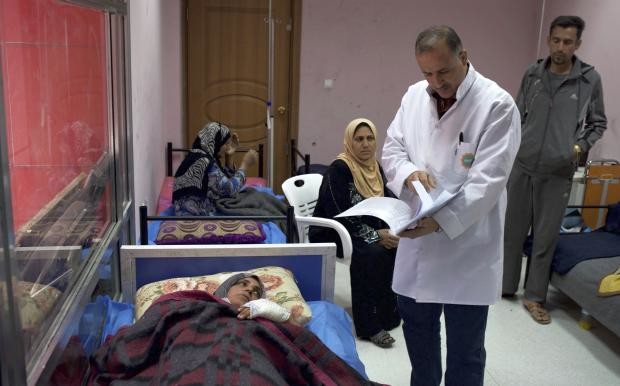Hospital struggles with Mosul’s injured – and its dead

A doctor looks at a patient¹s evidence in Qayara hospital 56 kilometers south of Mosul. Rabaa Abdullah, 34, suffered injuries from a mortar strike as she was standing outside her house in Mosul on Friday, March 31, 2017. The strike killed her sister and one of her daughters. (Photo by MSTYSLAV CHERNOV / AP)
QAYARA, Iraq — The hospital in Qayara sometimes receives so many dead bodies that they do not fit in the refrigerator unit and have to be left in the corridors. Inside the mortuary, the dead are simply put on the floor because there are no containers, sometimes piled one on top of the other in a gruesome fashion and wrapped in a blanket, just as they were brought in.
The bodies are casualties from Mosul, where Iraqi forces backed by US-led coalition forces have been battling the Islamic State group for over five months to take control of the city.
“We asked for shelves but they gave us nothing,” shrugged Dr. Mansour Marouf, the hospital’s chief surgeon.
The beleaguered Qayara hospital is one of only two public hospitals within a 193-kilometer radius, between Mosul and the central Iraqi city of Tikrit. It is overwhelmed with casualties from the field clinics in Mosul, where Iraqi forces have been battling Islamic State group militants for over five months. Activity in the hospitals mirrors the intensity of the operation: 21 dead on Friday, nothing on Saturday.
Since it reopened in January, after Qayara had been retaken by Iraqi troops from IS, it has treated over 2,000 patients, including some 600 battle casualties.
The hospital is also responsible for general health care, including maternity care, for the hundreds of thousands of people living in the surrounding area. Yet it receives no government support – even doctors’ salaries are covered by a foreign aid organization. It has only six surgeons who get so busy when the injured start flowing in that sometimes they sleep no more than a few hours in several days. It has only two operating theaters and 50 beds because the upper levels of the hospital were destroyed in the fighting, leaving only the ground floor usable. Medical equipment is also lacking.
“It is shameful to say this but we have received no help and no support from the government at all even though the town was liberated eight months ago,” said Dr. Mansour.
He said the only public help they got was from the local governorate, which sent forensic inspectors twice a week to try to identify the dead who come in without an identity card or a relative. Everything else, including all the equipment and the medical disposables, have been paid for by WAHA, a foreign aid organization that focuses on health issues.
It has even occurred to Dr. Mansour that they are being ignored by officials because of suspicions they might harbor toward local residents who spent over two years under IS rule. “But every employee has been checked by the security services so they cannot even blame it on that,” he said.
The hospital’s situation underscores the extent to which the Iraqi government’s efforts to reclaim the areas that it lost to IS in 2014 have been uneven at best. Military operations, assisted by the US-led coalition, have been proceeding relatively evenly, if slowly, but the provision of public services, let alone reconstruction, has only barely begun or not at all in most liberated towns.
Dr. Mansour recalled that the hospital hosted a visit by the European Union’s humanitarian-aid commissioner several weeks ago when it was announced that the EU would donate $42.5 million emergency aid to Iraq this year, some of it for health care. When asked if any of that aid has reached them yet, the surgeon only laughed.
“We requested a lot of things. We sent a lot of lists. Every time we ask them they say we will help but then nothing happens,” he said. –Balint Szlanko and Yesica Fisch














